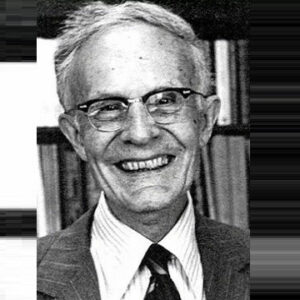Theodore William Schultz was an American economist who won the Nobel Memorial Prize in Economic Sciences in 1979 for his work on the importance of human capital in economic development. Sir William Arthur Lewis, another economist, shared the prize with him. He was an empirical economist whose study focused on international agricultural concerns. The University of Wisconsin awarded him a bachelor’s degree and a doctorate in agricultural economics. He taught at Iowa State College and the University of Chicago during his academic career. From 1946 until 1961, he was the chairman of the University of Chicago’s Department of Economics. Though he began his career as an agricultural economist, pioneering studies on agricultural issues in the United States and developing nations, he is best known for his work on human capital. ‘The Economic Value of Education’ (1963), ‘Economic Growth and Agriculture’ (1968), and ‘Investing in People: The Economics of Population Quality’ were among his many writings (1981).
Childhood and Adolescence
Theodore William Schultz was born on April 30, 1902, in Arlington, South Dakota, to an agriculturist family.
Due to a labor shortage during World War I, he had to stop studying in the eighth grade. Later, in 1921, he attended South Dakota State College for a minor in agriculture.
He attended at the University of Wisconsin in 1924 and received degrees in agriculture and economics in 1928. In 1930, he earned a Ph.D. in Agricultural Economics from the University of Wisconsin.
Career of Theodore Schultz
In 1930, he began his career at Iowa State College, where he remained until 1943. The West saw its longest-lasting economic collapse during this time, which was dubbed the “Great Depression.”
Beginning his career at this time period benefited in the acquisition of knowledge and understanding. Due to the Oleo-Butter War, he left Iowa in 1943 and relocated to Chicago.
From 1943 to 1952, he worked as a Professor of Economics in Chicago. He then moved on to global agricultural challenges. In his book ‘Transforming Traditional Agriculture,’ published in 1964, he stated that poor farmers in developing countries use innovation to increase agricultural productivity. Rural poverty, in his opinion, existed because government policies favored city inhabitants.
His research into agricultural issues resulted in the identification of several major themes, including the treatment of agriculture as a major economic entity, understanding prices and resource allocation, opportunities for increasing rather than decreasing agricultural returns, the importance of economic incentives in decision-making, and so on.
Theodore Schultz was the chairman of the university’s Department of Economics from 1946 until 1961. He launched research on the quick recovery of nations such as Japan and Germany following World War II while acting as chairman of the economics department, and compared their development to that of the United Kingdom, where food rationing remained long after the war ended.
This study came to the conclusion that a healthy and educated population aids economic growth since education makes people productive and healthcare aids in the maintenance of education investment, allowing them to create. This was considered one of his most significant contributions, and it was eventually dubbed “Human Capital Theory” in economics.
From 1952 until his retirement in 1972, he was the Charles L. Hutchinson Distinguished Service Professor at the University of Chicago. Even after his retirement, he continued to be active in university activities until his latter years.
Throughout his career, he published a number of books and papers. ‘Reflections on Poverty in Agriculture’ (1950), ‘Investment in Human Capital’ (1961), ‘The Economic Value of Education’ (1963), and ‘Transforming Traditional Agriculture’ are only a few examples (1964).
Major Projects of Theodore Schultz
Theodore Schultz was an economist who specialized in agricultural studies and research around the world. He was involved in a study of the role of agriculture in economic growth, and the results had a significant impact on the formulation of industrialization policies in both developed and developing countries.
Achievements & Awards
He was awarded an honorary doctorate of science by South Dakota State University in 1959. Other than that, he received a number of honorary degrees over his career.
He was elected president of the American Economic Association in 1960.
In 1972, he was awarded the American Economic Association’s Francis A. Walker Medal.
In 1976, he received the International Agricultural Economic Association’s Leonard Elmhirst Medal.
He and economist Arthur Lewis shared the Nobel Memorial Prize in Economic Sciences in 1979.
Personal History and Legacy
In 1930, Theodore Schultz married Esther Florence Wert. They had two girls and a son together.
He died on February 26, 1998, in Illinois, United States of America. At the time of his death, he was 95 years old.
Estimated Net Worth
The estimated net worth of Theodore Schultz is unknown.


